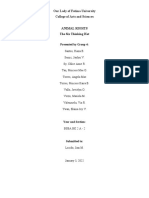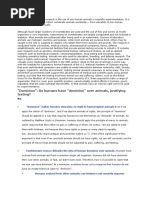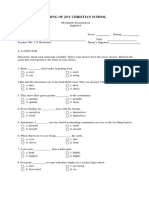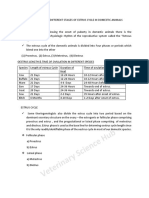Religion and Animal Rights: Sanctity of Life Responsibility Extinction
Religion and Animal Rights: Sanctity of Life Responsibility Extinction
Uploaded by
thatsnotmeCopyright:
Available Formats
Religion and Animal Rights: Sanctity of Life Responsibility Extinction
Religion and Animal Rights: Sanctity of Life Responsibility Extinction
Uploaded by
thatsnotmeOriginal Description:
Original Title
Copyright
Available Formats
Share this document
Did you find this document useful?
Is this content inappropriate?
Copyright:
Available Formats
Religion and Animal Rights: Sanctity of Life Responsibility Extinction
Religion and Animal Rights: Sanctity of Life Responsibility Extinction
Uploaded by
thatsnotmeCopyright:
Available Formats
Religion and Animal Rights
Sanctity of Life
lifer is sacred because it is God-given
Responsibility
duty; the idea that we are in charge of our own actions
Extinction
when all members of a species have died out and that species will never exist on
earth again
Free Range
Farming
farming that allows the animals to roam free and behave naturally
Factory Farming
small spaces
when animals are used for meat or dairy products but are kept indoors in very
Vegetarianism
the belief held by people who do not eat meat
Vegan
a person who will not use any animal product
Fur Trade
clothing
the business of farming or hunting wild animals for their fur to be made into
Ivory Trade
the sale of ivory from elephants tusks, often illegally
Animal Experiments
testing on animals either for medical or cosmetic purposes to ensure that
the product is safe for use by humans
Genetic Modification
plants and animals that have had their natural make up altered by
scientists
Cloning
the scientific method by which animals or plants can be created which have
exactly the same genetic make-up as the original, because the DNA of the original
is used
Animals and Humans
The theory of evolution describes life developing over millions of years, from tiny single celled creatures
into more and
more complex varieties of animals and finally humans.
Most people believe that humans are on a higher level than animals and religions tend to support this
idea with the
exception of Buddhism all religions are taught that God created animals for a purpose to be of value
and support to
humans.
Reasons why animals are considered of less value than humans:
Religious people believe that being reincarnated as an animal is a punishment for past misdeeds
Animals do not seem to have the ability to reason a decision
Humans can read, write and understand ideas
Humans have the ability to act in moral ways, animals cannot make that decision
Animals dont have religious beliefs, or do not worship and communicate with God nor follow
any kind of moral code
Most people would claim that just because the status of animals is lower it does not mean that humans
should mistreat them. Religions teach that although animals are not equal to humans, they should be
cared for and respected as a part of the natural world.
Protecting the Rights of Animals
Protecting Animals by Law
International Animal Rights Day 10th December each year
Campaigners from Animal Rights groups think animals
should have similar rights of protection from exploitation and
suffering as humans
Peaceful protesting includes; candle lit vigils, marces, letters
to MPs
Violent protesting includes; breaking into labs and releasing
animals held for research, targeting individuals who work in
the animal research field
WWF (World Wide Fund for Nature)
RSPCA (Royal Society for the Prevention of Cruelty to
Animals)
Cruelty and neglect of animals are criminal offences in the
UK
Some restrictions to animals as pets
Animals experiments to research and test cosmetics are
banned
Legal experiments for medical and other research are
inspected to make sure animals are not suffering
Foxhunting/dog fighting are illegal
Strict regulations about animal exports/transporting animals
for slaughter/management of abattoirs where animals are
slaughtered
Contemporary Use and Abuse of Animals
Issues
Wild Animals
Useful
Animals
Overview
Zoos, Safari parks and Aquariums
(+)Dangerous wild animals seen in a safe
controlled environment provides
entertainment for families
(+)Educations activities and breeding
programmes that have saved rare species
from extinction
(+)Some zoos pay for research into
animals
(-) Some zoos and safari parks do not
always provide suitable environments for
animals
(-) Some animals cannot adjust to the
climate and environments as they are so
different
Pets provide companionship and a way of
expressing affection
Guide dogs provide partially sighted
people with the opportunity to lead more
independent lives e.g helping them to
cross roads
Animals are used for transport of people
and goods. Some animals used are
donkeys, camels and horses
Religious Attitudes
Most accept zoos if the
conditions are similar to
natural habitats
Most recognise that zoos
can help preserve species
Leaders of 6 world religions
met in Assisi, Italy, the
home of St Francis, the
patron saint of animals.
Here they made statements
about how people should
act responsibly for the
welfare of the earth
including animals (Assisi
Declarations)
Most religions do not forbid
pets
Many religions do not
object as long as the animal
is cared for.
Some religious people
believe animals have
healing qualities
Animals for
Food
Animals used in the workplace can include
sniffer dogs for police to follow a trail and
seek out drugs, or in the military they are
used to locate mines
Some people object to eating animals and
say that humans have no right to rule over
animals (usually vegetarian or vegan)
Others accept the use of animals for food
Free range farming
Factory farming
Slaughtering: In Britain the animal is
stunned first and then the animal is
slaughtered and bled out so the meat is of
better quality
Animals in
Sport
Animal
Experiments
The Fur and
Ivory Trade
Use of animals in sport is historically for
competitive purposes
Hunting is taken from the survival of the
first humans, whose life depended on
hunting. Once food became easier to
obtain hunting became a sport rather than
a necessity
Supporters of hunting claim that it helps
the countryside e.g. removing pests like
foxes which attack other livestock like
chickens
Opposers of hunting argue that it is cruel
and parliament passed a law in 2004
banning hare coursing and the hunting of
wild animal
Medical drugs are tested on animals before
they can be sold to humans
Testing cosmetics on animals is now illegal
The government inspects laboratories to
ensure animal suffering is kept to a
minimum
Genetic Modification means that
animals have been genetically modified,
usually so they are in better health and
produce better quality meat
Genetic Modification has also been used
to create organs that can be used for
transplants in humans
Cloning is creating an organism that is
the exact genetic copy of another e.g.
Dolly the Sheep was a clone of Tracy the
Sheep in Scotland
Over 55million animals are killed each year
for the fur trade
Fur farming was made illegal in England
and Wales in 2000
People who are against the fur trade argue
that it is not natural for the animals and
the methods of slaughter are cruel e.g.
electrocution
Most Buddhists and
Hindus are vegetarian
killing an animal might be
killing a body that contains
an ancestors soul
Christianity does not
teach followers not to eat
meat. They believe animals
were created by God to
provide humans with food
After the great flood God
told Noah that people may
eat animals
Buddhists first precept is I
will not harm any living
thing
Some Christians believe
hunting is justified as God
told them to bring animals
under control. Others say
they are part of Gods
creation and we have a
duty to protect them
Buddhists oppose animal
experiments, as they see
animals as equal to humans
Most Christians accept
limited testing on animals
in order to find cures for
diseases
People who are for the fur trade argue that
it is worth up to 500 million and creates
jobs for people in poorer countries
--------------------------------------------------------------------------In 1989 the United Nations made the ivory
trade illegal everywhere
Recently the European Union approved the
sale of 108 tonnes of ivory in China where
there is a huge demand as they believe
that ivory has healing properties and use it
in medicines
In some countries they are allowing ivory
trade because it makes so much money
that it is able to fund military operations
killing elephants is funding war
You might also like
- Science Verifies That Humans Are FrugivoresDocument7 pagesScience Verifies That Humans Are Frugivoreswishro92% (13)
- Yr 10 Revision Topic 2Document19 pagesYr 10 Revision Topic 2api-320022467No ratings yet
- Blood Sport Dog Fighting: FooodDocument4 pagesBlood Sport Dog Fighting: Fooodshima95No ratings yet
- Animal Rights: "The Worst Sin Towards Our Fellow Creatures Is Not To Hate Them, But ToDocument22 pagesAnimal Rights: "The Worst Sin Towards Our Fellow Creatures Is Not To Hate Them, But ToHaleema SultanNo ratings yet
- Thesis For Use of AnimalsDocument2 pagesThesis For Use of AnimalsFannyNo ratings yet
- Fresh Food Diets - The Best Choice For Optimum Health For Dogs and Cats!Document13 pagesFresh Food Diets - The Best Choice For Optimum Health For Dogs and Cats!AnaBelenNo ratings yet
- Animal Rights 2Document7 pagesAnimal Rights 2Kate20No ratings yet
- Debate Topic VDocument2 pagesDebate Topic VRahma Fadillah SophaNo ratings yet
- A Growing Number of People Feel That Animals Should Not Be Exploited by People and That They Should Have The Same Rights As HumansDocument4 pagesA Growing Number of People Feel That Animals Should Not Be Exploited by People and That They Should Have The Same Rights As HumansSons YesuNo ratings yet
- 1 SchweissDocument14 pages1 Schweissapi-317222895No ratings yet
- Group 4 - Animal RightsDocument16 pagesGroup 4 - Animal RightsElaina JoyNo ratings yet
- Group 4 - Animal RightsDocument16 pagesGroup 4 - Animal RightsElaina JoyNo ratings yet
- Pavitra NaaiduDocument6 pagesPavitra NaaiduPavitra DrewNo ratings yet
- Alison Hills Do Animals Have Rights 2002Document257 pagesAlison Hills Do Animals Have Rights 2002Ana García LópezNo ratings yet
- Group 3 - Activity On UtilitarianismDocument6 pagesGroup 3 - Activity On UtilitarianismCloud IXNo ratings yet
- EthicsDocument10 pagesEthicsIshita GoyalNo ratings yet
- Finalize Environmental DebateDocument6 pagesFinalize Environmental DebatehanisgreatNo ratings yet
- Key To Ielts Test On 28th, April, 2012 in Bc-IdpDocument2 pagesKey To Ielts Test On 28th, April, 2012 in Bc-IdpLan Phuong VuNo ratings yet
- Vegetarianism: I. Must We Kill in Order To Live?Document19 pagesVegetarianism: I. Must We Kill in Order To Live?Bharat Vala PatelNo ratings yet
- Reading 1Document2 pagesReading 1maythuzarlwin.mtzNo ratings yet
- Animal Testing or Animal Research Is The Use of NonDocument4 pagesAnimal Testing or Animal Research Is The Use of Nonalexis_hoNo ratings yet
- ANIMAL CARE - OrigionalDocument12 pagesANIMAL CARE - OrigionaleileenNo ratings yet
- Animals EssayDocument17 pagesAnimals EssayFormax2 FormaxNo ratings yet
- Animal Rights 1Document8 pagesAnimal Rights 1Kate20No ratings yet
- This House Believes That Animal Have Rights (+) Affirmative Team - Animal Rights Is Fundamental Principle About Moral and Legal Right ReasonDocument3 pagesThis House Believes That Animal Have Rights (+) Affirmative Team - Animal Rights Is Fundamental Principle About Moral and Legal Right ReasonRosi ArristaNo ratings yet
- Animal TestingDocument4 pagesAnimal TestingCristea RalucaNo ratings yet
- Hayvan HaklarıDocument19 pagesHayvan HaklarıAyşe Menteş GürlerNo ratings yet
- EssayDocument1 pageEssayAshima SoodNo ratings yet
- EssaDocument1 pageEssaAshima SoodNo ratings yet
- Law Schools of CanadaDocument1 pageLaw Schools of CanadaAshima SoodNo ratings yet
- CASE STUDY MiceDocument7 pagesCASE STUDY MiceCHA RLESNo ratings yet
- Animal Rights and ProtectionDocument3 pagesAnimal Rights and Protection122809No ratings yet
- Position Paper: Background InformationDocument5 pagesPosition Paper: Background InformationJiny BautistaNo ratings yet
- The Treatmen of Animals On Farms or in ResearchDocument2 pagesThe Treatmen of Animals On Farms or in ResearchMARIA DE LOS ANGELES BARANDICA ZAMBRANONo ratings yet
- ENG Project MergedDocument20 pagesENG Project MergedlarishaupadhyayaNo ratings yet
- Expo TabooDocument2 pagesExpo TabooKhriz HernándezNo ratings yet
- VegetarianDocument59 pagesVegetarianRatnesh MishraNo ratings yet
- TM-4 Use of Animals in Research and EducationDocument37 pagesTM-4 Use of Animals in Research and EducationAnita Maulinda Noor100% (1)
- Animal WelfareDocument2 pagesAnimal WelfareMoitrayan NathNo ratings yet
- Vegetarianism Is The Practice of Abstaining From The: Meat Red Meat Flesh Animal By-Products Animals Processed For FoodDocument10 pagesVegetarianism Is The Practice of Abstaining From The: Meat Red Meat Flesh Animal By-Products Animals Processed For FoodLisii AlionaNo ratings yet
- What Can The Diet of Gorillas Tell Us About A Healthy Diet For Humans - The Weston A. Price FoundationDocument7 pagesWhat Can The Diet of Gorillas Tell Us About A Healthy Diet For Humans - The Weston A. Price FoundationJonhangel UtreraNo ratings yet
- 10 Debated Acts of Animal Cruelty: Fur TradeDocument6 pages10 Debated Acts of Animal Cruelty: Fur Tradefernandosanzy_366552No ratings yet
- Animal RightsDocument13 pagesAnimal Rights6w5n9bjzzbNo ratings yet
- Should Everyone Switch To Plant-Based Diet?: by Annie XuDocument6 pagesShould Everyone Switch To Plant-Based Diet?: by Annie Xudevin howardNo ratings yet
- BaileythesispaperDocument11 pagesBaileythesispaperapi-286679523No ratings yet
- Political Theory and EcologyDocument14 pagesPolitical Theory and EcologyDHRUV CHOPRANo ratings yet
- Ansci 1. Chapter OneDocument9 pagesAnsci 1. Chapter OneLaisa RarugalNo ratings yet
- Vegetarian or Non-Vegetarian?Document3 pagesVegetarian or Non-Vegetarian?nandini_goel1408No ratings yet
- Humans Are Definitely Omnivores. The Best Evidence Is Our Teeth: We HaveDocument2 pagesHumans Are Definitely Omnivores. The Best Evidence Is Our Teeth: We HaveAurea Jasmine DacuycuyNo ratings yet
- English Through Debate Homework Assignment 2: The Affirmative TeamDocument3 pagesEnglish Through Debate Homework Assignment 2: The Affirmative TeamSandraNo ratings yet
- Antropocentrism and CrueltyDocument13 pagesAntropocentrism and Cruelty2093 Disha ShettyNo ratings yet
- UntitledDocument11 pagesUntitledvezNo ratings yet
- How Humans Are Not Physically Created To Eat MeatDocument6 pagesHow Humans Are Not Physically Created To Eat Meatapi-57920320No ratings yet
- Introduction To Animal Science For Plant ScienceDocument63 pagesIntroduction To Animal Science For Plant ScienceJack OlanoNo ratings yet
- Not Fit for a Dog!: The Truth About Manufactured Dog and Cat FoodFrom EverandNot Fit for a Dog!: The Truth About Manufactured Dog and Cat FoodNo ratings yet
- Dr. Anthony Chaffee: Why we are carnivores …and how plants try to poison you.: The science and evidence supporting our real ancestral diet. Featuring Dr. Thomas Seyfried.From EverandDr. Anthony Chaffee: Why we are carnivores …and how plants try to poison you.: The science and evidence supporting our real ancestral diet. Featuring Dr. Thomas Seyfried.Hermos AvacaNo ratings yet
- On Screen 1 Progress Check 6 - Print - QuizizzDocument7 pagesOn Screen 1 Progress Check 6 - Print - QuizizzGustavo MaldonadoNo ratings yet
- Complete The Gaps With The Correct Collective Noun For Each Group of Animals. These Nouns Are Sometimes Called Terms of Venery'Document2 pagesComplete The Gaps With The Correct Collective Noun For Each Group of Animals. These Nouns Are Sometimes Called Terms of Venery'Anne-Mari SalageanNo ratings yet
- Phylum PoriferaDocument18 pagesPhylum Poriferagonoles81No ratings yet
- Trematodes AssignmentDocument6 pagesTrematodes AssignmentJackie Lind TalosigNo ratings yet
- Basking SharkDocument10 pagesBasking SharkOseNo ratings yet
- Logchem 2010 - Poster - Milia (Grevena, Macedonia, Greece) - A Dangerous Area For Mammut Borsoni.Document1 pageLogchem 2010 - Poster - Milia (Grevena, Macedonia, Greece) - A Dangerous Area For Mammut Borsoni.logch038No ratings yet
- Which Came First: The Chicken or The Egg?Document3 pagesWhich Came First: The Chicken or The Egg?Nguyễn Thanh TâmNo ratings yet
- Assignment of Diversity of AnimalDocument6 pagesAssignment of Diversity of AnimalA TNo ratings yet
- Evolution of SpidersDocument15 pagesEvolution of SpidersHammad RazaNo ratings yet
- Our Winged FriendsDocument16 pagesOur Winged Friendsarun_tacde100% (1)
- Australian Birdkeeper June-July 2018Document60 pagesAustralian Birdkeeper June-July 2018Gábor Deák100% (1)
- 25mb File-TestingDocument39 pages25mb File-TestingKarthik YogeshNo ratings yet
- Human Disturbances of Waterfowl: Causes, Effects, and ManagementDocument7 pagesHuman Disturbances of Waterfowl: Causes, Effects, and ManagementAlina CiurciNo ratings yet
- ACF-Dog - Cat Adoption ApplicationDocument5 pagesACF-Dog - Cat Adoption ApplicationBrittneyNo ratings yet
- PaperTech - TRO Clan InvasionDocument5 pagesPaperTech - TRO Clan InvasionBubba Tattoo0% (1)
- Livestock Welfare Assessment (Part 1) : Lecture NotesDocument20 pagesLivestock Welfare Assessment (Part 1) : Lecture NotesEdzel Tisado SacloloNo ratings yet
- Kelly Sweeney, PHD - The Basics of Troubleshooting in A HatcheryDocument52 pagesKelly Sweeney, PHD - The Basics of Troubleshooting in A Hatcherymohamed helmyNo ratings yet
- ParthenogenesisDocument2 pagesParthenogenesisShruti TiwariNo ratings yet
- Ventas Por ClienteDocument52 pagesVentas Por ClientecomercialbogosdNo ratings yet
- 4th Quarter in English Grade 6Document8 pages4th Quarter in English Grade 6Roxanne Rafanan100% (1)
- Biology ConclusionDocument2 pagesBiology Conclusionapi-297841438No ratings yet
- Animal FolkDocument12 pagesAnimal FolkRoseNo ratings yet
- Quick Facts: Omnivore 5 To 9 Years 7.5 - 13 CM 2 - 20 Grams Diet: Life Span: Size: WeightDocument2 pagesQuick Facts: Omnivore 5 To 9 Years 7.5 - 13 CM 2 - 20 Grams Diet: Life Span: Size: WeightAlaNo ratings yet
- Nikunj X-E 43 English Project Pets and Their CareDocument10 pagesNikunj X-E 43 English Project Pets and Their CareNIKUNJ GARGNo ratings yet
- Evs Wrksheet p3Document2 pagesEvs Wrksheet p3Rashmi MehtaNo ratings yet
- Past Simple Complete The DialogueDocument2 pagesPast Simple Complete The DialogueUbaldo Pico SierraNo ratings yet
- Estrous Cycle Different Stages in Domestic Animals PDFDocument3 pagesEstrous Cycle Different Stages in Domestic Animals PDFYounas marri100% (1)
- A New Species of Praying Mantis From India: M.C. Vyjayandi and T.C. NarendranDocument2 pagesA New Species of Praying Mantis From India: M.C. Vyjayandi and T.C. Narendransutarto kusumaNo ratings yet
- Miami Seaquarium Inspection Report 2021Document17 pagesMiami Seaquarium Inspection Report 2021Michelle SolomonNo ratings yet
- Human Reproduction NCERT by Om MishraDocument14 pagesHuman Reproduction NCERT by Om Mishratemp93630No ratings yet

























































































